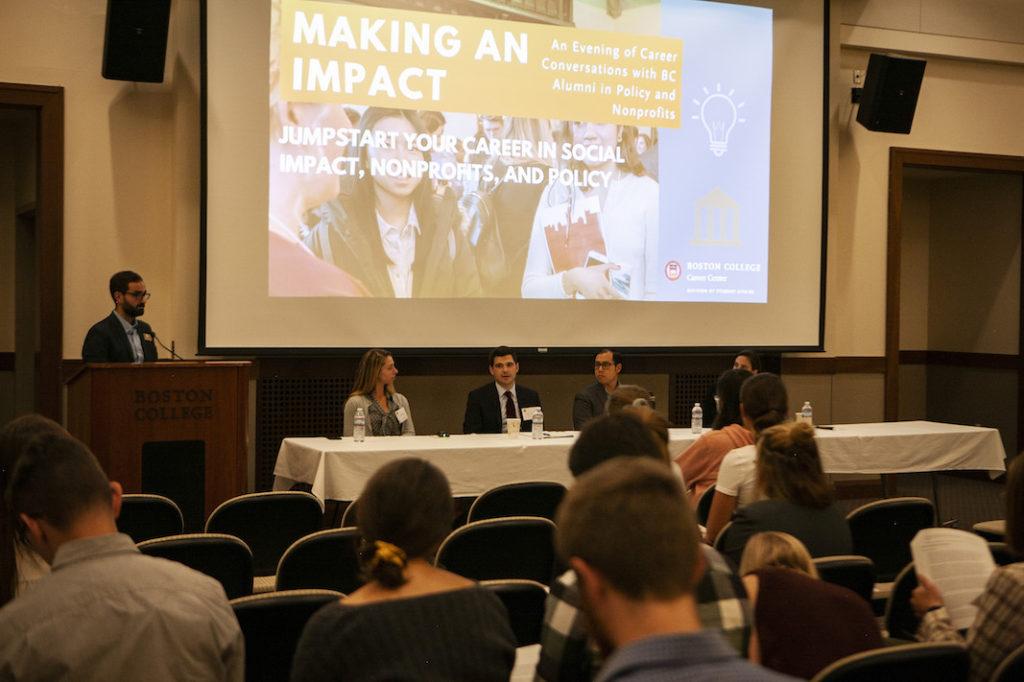The Boston College Career Center brought 15 alumni back to the Heights to help students interested in public policy and non-profits learn more about potential vocations on Monday. After a question-and-answer session with a four-person panel, students and alumni engaged in an hour-long networking session.
The panel featured Annelise Eaton, BC ’13; An H. Le, BC ’13; Matt Pecoraro, BC ’16; and Elissa Spelman, BC ’00. Salvatore Cipriano, assistant director of career education at the Career Center and BC ’10, gave the first question to Eaton and Spelman, asking them about the journey from BC to their current positions.
Eaton, who is a senior associate at the Rennie Center for Education Research and Policy, spoke highly of her education as an English major. She said that she uses those skills on a daily basis in her job, despite the stereotypes about the lack of practical application for English degrees.
Eaton does research on education reform strategies. As an undergraduate, she majored in both human development and English and came back to BC for a Master’s in applied development and educational psychology.
Spelman was more critical of her education, as she felt the classes she took did not adequately prepare her for the classroom. She began her career as a third grade teacher in the Neighborhood Charter House in Dorchester, but now is the executive director for Breakthrough Greater Boston, which trains teachers and prepares low-income students for college.
This frustration, however, led her to re-evaluate her career plans, and she drew on this experience to help her oversee the teacher training program at Breakthrough in hopes of giving her students the skills she had lacked.
Cipriano posed the next question to Pecoraro and Le, what compelled them to attend graduate school. Pecoraro studied macro social work at BC, while Le attended both the School of Social Work and BC Law.
Both emphasized the importance of work experience in helping them formulate what career they wanted to pursue. Pecoraro said that he moved to Washington, D.C. after undergrad to work for a non-profit that creates homes for adults with disabilities, but realized after a few years that he wanted to do more.
Le said he had a similar experience of discovering a career in macro social work—a field he didn’t even know existed—while he worked as a Jesuit Volunteer and later as a mental health caseworker.
“It was in my experience there that I recognized how our program had been set up to fail,” Le said. “Not on purpose, but the sort of operating policies and procedures that various grantors from the state down to the county, down to the non-profit, put upon us made it really, really difficult for us to succeed. And so I thought to myself, you know, it would be really cool to be in a place where I could design things”
Today, Le is the Policy Communications Advisor for Boston’s Office of Immigrant Advancement.
The discussion then turned toward a topic that Cipriano said many students in attendance likely had concerns about: financial stability. The panelists candidly responded that working in public policy is ultimately an individual decision, and financially may not be the best fit for everyone. They all agreed, however, that they feel more financially stable than they expected. Spelman advised the audience to look at long-term career benefits, instead of focusing on the starting salary.
Similarly, Eaton and Pecoraro pointed out that it’s never too late for a career change.
“You’re never locked into anything,” Eaton said. “I think I very much loved college, I cared deeply about education, but was terrified [and thinking], ‘Okay, if I go out and take a job with a non-profit, am I signing my life away to never making any money?’”
“But I think looking back, I would say to myself, ‘What are you so afraid of [at] 22, 23? You could change your mind 10 times, you know, [and] your first job is a learning experience, it’s as much about figuring out what you want to do as your four years of college are.”
The topic then turned to “a-ha” moments. Pecoraro said he never had a career-defining moment but instead said he did what he felt was right, which led him to a series of smaller “a-ha” moments.
On the other side of the spectrum was Spelman, who said she wanted to address diversity and inclusion in education from an early age, but thought the only way to do so was through being a special education teacher. It wasn’t until her own career began to shift that she saw the different opportunities in front of her, she said.
Featured Image by Mason LaFerney / Heights Staff













